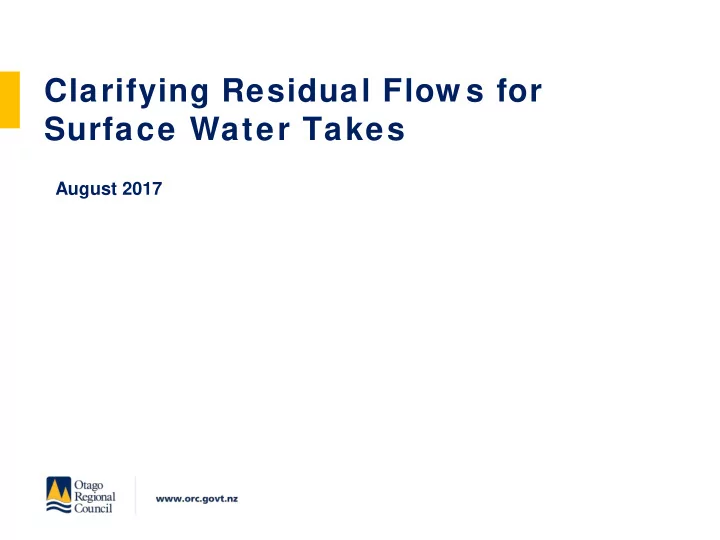

Clarifying Residual Flow s for Surface Water Takes August 2017
Clarifying Residual Flow s Purpose of consultation is to clarify: The difference between residual and minimum flows Purpose of the plan change Who may be affected Overview of what we heard last time The plan change process Today’s consultation session
Minimum Flow s Set on main stems of rivers and apply to permits in the whole catchment When a minimum flow is reached in the main stem, restrictions will apply to taking water Set by a plan change process The plan change process includes in depth analysis, community consultations; and consideration of all values
Residual Flow s Usually apply on tributaries They are applied as a condition to a permit to take surface water Specify the amount of water to be left in the river immediately downstream of a water take Values that are considered in determining the residual flow are natural character and aquatic ecosystem
What w ill this plan change do? The aim is to provide better clarity and certainty within the Plan provisions Through this plan change process we want to investigate whether to: Provide a method to calculate a residual flow Identify a broader list of values for consideration in assessment Enable flexibility for measurement of a residual flow
You may be affected if you: Currently have a water permit or deemed permit and are looking to replace it Are thinking of applying for a new water permit “You’re developing minimum Have an existing water permit that you’re wishing to flows in my catchment, how review as part of a group consent application does this plan change work with that?”
What we’ve identified in the Plan Issue 1 Current definition of residual flow is narrow: addresses only natural character and aquatic ecosystems– should other values be included? Other parts of the plan refer to leaving water for other users There is currently no explicit relationship between these two matters
What we’ve identified in the Plan Issue 2 Residual flow must be AT the point of take Current plan is not flexible enough for group situations where there are multiple points of take Place where water is taken may not be suitable for measuring a residual flow Strategically sited collective residual flow sites may be more appropriate
What we’ve identified in the Plan Issue 3 There are different views on how residual flows are calculated A method for calculating residual flows may help to clarify this Clarity will help reduce disagreements
Desired outcomes flexibility for water users allowance for downstream users fewer residual flow sites clear method to calculate residual flows water management groups are supported
Clarifying w hat w e heard last time The plan change isn’t needed as the current provisions are working fine It should be done at a later date and as part of a more comprehensive plan change This will make it harder to replace my permit. I’ve already got a residual flow and you’ll review it, this will make it worse for me
Next steps The plan change process: This round of consultation – August 2017 Develop options – including economic, social analysis Identify a preferred option “You’re developing minimum Prepare and notify the plan change flows in my catchment, how Formal submissions sought does this plan change work Hearing with that?” Commissioner deliberations Plan change decision Resolve any appeals
Today’s consultation session Small group discussion ORC staff member at each table Five questions to run through – 40 mins Record all points raised “You’re developing minimum Feedback session to the broader group flows in my catchment, how does this plan change work Opportunity to fill in feedback form, including on-line with that?” form Talk to staff afterwards about specific questions Email or phone in any queries This consultation closes Thursday 31 st August 2017
“You’re developing minimum Thank you flows in my catchment, how does this plan change work with that?”
Recommend
More recommend